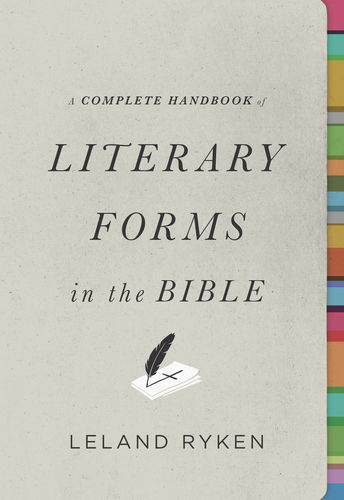Leland Ryken: A Complete Handbook of Literary Forms in the Bible
 Leland Ryken, A Complete Handbook of Literary Forms in the Bible (Wheaton, IL: Crossway, 2014), 220 pages.
Leland Ryken, A Complete Handbook of Literary Forms in the Bible (Wheaton, IL: Crossway, 2014), 220 pages.
Leland Ryken, past professor of English at Wheaton College (Illinois), has spent a significant amount of his career helping readers improve their interpretation and appreciation of the literary character of the Bible. A Complete Handbook of Literary Forms in the Bible is just another splendid entry in that effort. The purpose of this book was to define the literary forms utilized in the bible recognized by literary and biblical scholars and list them alphabetically. While this reviewer cannot verify that the book identifies every type of literary form used in the bible, it is unlikely that readers would notice any missing entries.
Though the book reads like a dictionary with terms followed by a brief a brief definition, the format makes for rapid reading. Fortunately, Ryken frequently illustrates entries by referencing particular bible passages. It is unclear as to why an index of passages was not included. Less frequently, but of no less significance, Ryken gives extended explanations on how to appreciate the form’s beauty and how to interpret it properly. Entries with extended discussions include Device of Disclosure, Echo, Encomium, Figurative Language, Love Poem, Parable, Praise Psalms, Structure of a Text or Passage, and Theme and Variation. I suggest that these entries are worth their exegetical weight in gold and combine to make the book a screaming bargain. Unfortunately, the book’s brevity means that Ryken did not provide a bibliography or footnotes. Readers looking for more detail and explication of many of the book’s entries are advised to consult the Dictionary of Biblical Imagery, which Ryken was a general editor.

Leland Ryken
Ryken repeatedly attacks two main errors he believes hinders right understanding and appreciation of the text. The first problem is naive literalism. Ryken rightly notes that God is not literally a shield nor does He have hands. Alternatively, Ryken argues that just because a metaphor is not literally true does not mean we should think of it as less true. Metaphors, like other literary forms, force us to think more deeply about a passage as the comparisons and meanings are not always readily apparent without further reflection. The second error is the tendency to ignore or devalue the artistic elements of scripture. Readers should pay attention to the content, says Ryken, but not to the extent of ignoring the way the content is packaged. He asks readers to consider the possibility that the packaging (forms) used by biblical writers is just as inspired as the content (meaning) itself.
Readers wanting a fast introduction (or reintroduction) to the literary forms of the Bible should read this book. Those willing to integrate its contents into their bible reading will reap significant rewards that will benefit their understanding, appreciation, and proclamation of God’s word.
Reviewed by Stephen M. Vantassel
Publisher’s page (excerpt available): https://www.crossway.org/books/a-complete-handbook-of-literary-forms-in-the-b-tpb/
Category: Biblical Studies, Summer 2016


